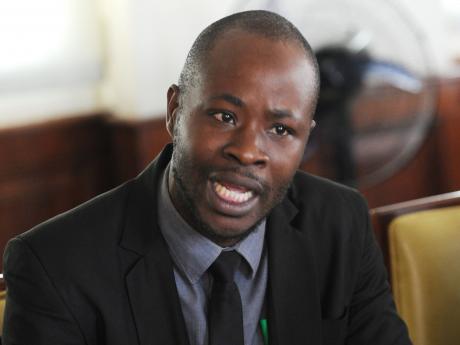
JASL advocates for protection of health, sexual orientation and HIV status informationGroup made suggestion to joint select committee of Jamaican Parliament reviewing the Data Protection Act.
Image: Advocacy Officer and spokesperson, JASL, Patrick Lalor
The Jamaica AIDS Support for Life (JASL) wants the Data Protection Act to make provisions to protect information on an individual’s sexual orientation and behaviour as well as sexual activities and attractions.
The group made the suggestion on Tuesday 27 March in its submission to the joint select committee of the Parliament of Jamaica reviewing the Data Protection Act.
The human rights organisation which has as its clients many of Jamaica’s vulnerable sexual groups, made five recommendations to the committee.
Among them, a deliberate effort in the wording of the Act to protect people’s health information, sexual orientation and HIV status.
Advocacy Officer and spokesperson for the group, Patrick Lalor said the Data Protection Act should protect information on people’s sexual orientation and HIV status. He also wants the Bill to reflect prohibitions for insurance companies to require HIV tests to provide coverage, noting that it was easier for an individual who was hypertensive and had a pre-existing condition to get coverage, than for an HIV positive individual even as new medicines have emerged allowing people with the virus to live longer.
However, committee members Franklin Witter, Juliet Cuthbert Flynn and Julian Robinson disagreed with various aspects of the presentations.
Flynn said many individuals were denied policies with conditions other than HIV.
She said she was unable to get full coverage because of surgery done when she was 19 years old.
It was the view of most that insurance companies were driven by profits and were not keen on making payouts if it was determined that an individual’s pre-existing condition would cause early payout of massive sums.
Key submissions by Jamaica AIDS Support for Life for Data Protection Act:
*A more deliberate effort in the wording of the Act to protect people’s information
*Revisiting the definition of a minor
*A more equitable system of obligation placed on data controllers
*The inclusion of an oversight body for the Information Commissioner
*The broadening of the definition of consent to include informed consent (consenting based on
knowledge of what is required) and coerced consent (information given by coercion).
WHAT IS PANCAP?
PANCAP is a Caribbean regional partnership of governments, regional civil society organisations, regional institutions and organisations, bilateral and multilateral agencies and contributing donor partners established on 14 February 2001. PANCAP provides a structured and unified approach to the Caribbean’s response to the HIV epidemic, and coordinates the response through the Caribbean Regional Strategic Framework on HIV and AIDS to maximise efficient use of resources and increase impact, mobilise resources and build the capacity of partners.
What are the Global AIDS Strategy 2021–2026 targets and commitments?
If targets and commitments in the strategy are achieved:
- The number of people who newly acquire HIV will decrease from 1.7 million in 2019 to less than 370 000 by 2025
- The number of people dying from AIDS-related illnesses will decrease from 690 000 in 2019 to less than 250 000 in 2025.
- The goal of eliminating new HIV infections among children will see the number of new HIV infections drop from 150,000 in 2019 to less than 22,000 in 2025.
What are the 95-95-95 Targets for ending AIDS?
- 95% of People Living with HIV know their HIV status;
- 95% of people who know their status on treatment; and
- 95% of people on treatment with suppressed viral loads.
HELPFUL LINKS:
Global AIDS Strategy 2021–2026, End Inequalities, End AIDS
https://pancap.org/pancap-documents/global-aids-strategy-2021-2026-end-inequalities-end-aids/
Caribbean Regional Strategic Framework on HIV and AIDS (CRSF) 2019-2025
https://pancap.org/pancap-documents/caribbean-regional-strategic-framework-2019-2025/
